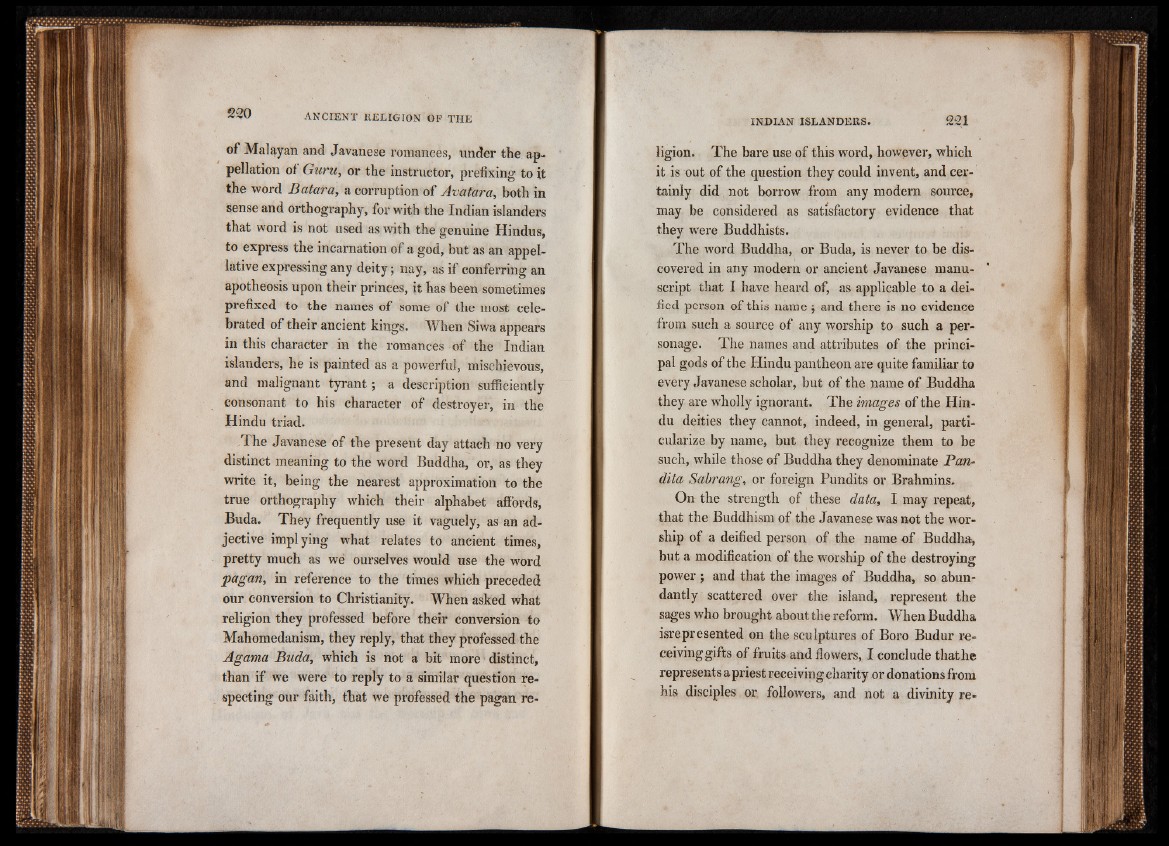
of Malayan and Javanese romances, under the appellation
of Guru, or the instructor, prefixing to it
the word Batara, a corruption of Avatara, both in
sense and orthography, for with the Indian islanders
that word is not used as with the genuine Hindus,
to express the incarnation of a god, but as an appellative
expressing any deity; nay, as if conferring an
apotheosis upon their princes, it has been sometimes
prefixed to the names of some of the most celebrated
of their ancient kings. When Siwa appears
in this character in the romances of the Indian
islanders, he is painted as a powerful, mischievous,
and malignant tyrant; a description sufficiently
consonant to his character of destroyer, in the
Hindu triad.
The Javanese of the present day attach no very
distinct meaning to the word Buddha, or, as they
write it, being the nearest approximation to the
true orthography which their alphabet affords,
Buda. They frequently use it vaguely, as an adjective
implying what relates to ancient times,
pretty much as we ourselves would use the word
‘pagan, in reference to the times which preceded
our conversion to Christianity. When asked what
religion they professed before their conversion to
Mahomedanism, they reply, that they professed the
Agama Buda, which is not a bit more distinct,
than if we were to reply to a similar question respecting
our faith, that we professed the pagan religion.
The bare use of this word, however, which
it is out of the question they could invent, and certainly
did, not borrow from any modern source,
may be considered as satisfactory evidence that
they were Buddhists.
The word Buddha, or Buda, is never to be discovered
in any modern or ancient Javanese manuscript
that I have heard of, as applicable to a deified
person of this name ; and there is no evidence
from such a source of any worship to such a personage.
The names and attributes of the principal
gods of the Hindu pantheon are quite familiar to
every Javanese scholar, but of the name of Buddha
they are wholly ignorant. The images of the Hindu
deities they cannot, indeed, in general, particularize
by name, but they recognize them to be
such, while those of Buddha they denominate Pan-
dita Sabrang, or foreign Pundits or Brahmins.
On the strength of these data, I may repeat,
that the Buddhism of the Javanese was not the worship
of a deified person of the name of Buddha,
but a modification of the worship of the destroying
power ; and that the images of Buddha, so abundantly
scattered over the island, represent the
sages who brought about the reform. When Buddha
isrepresented on the sculptures of Boro Budur receivinggifts
of fruits and flowers, I conclude tliathe
represents a priest receiving charity or donations from
his disciples or followers, and not a divinity re